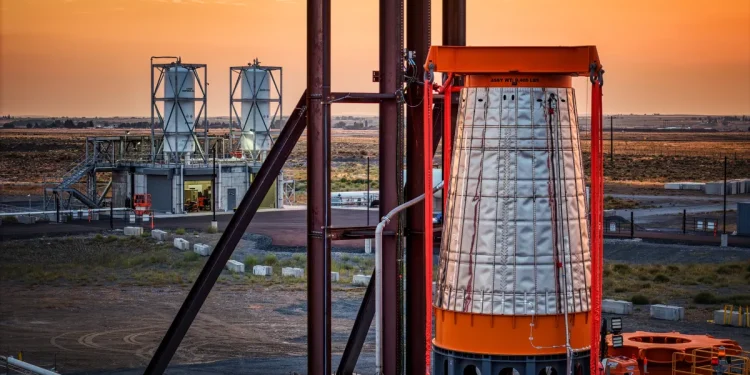Stoke Space announced a massive capital raise on Wednesday that might look, at first glance, like just another bet on the commercial launch market. The details tell a different story.
Led by billionaire Thomas Tull’s US Innovative Technology, a fund that explicitly invests in national security-related technologies, the $510 million Series D round highlights a larger shift in the launch industry. The old assumption was that the launch winners would be the companies that captured the lion’s share of commercial payloads.
While there is still demand on the commercial side from private constellation developers and for emerging use cases such as in-space manufacturing or lunar payloads, the center of gravity has shifted decisively toward defense.
Just a few years ago, space startups were selling investors on visions of a rapidly expanding commercial market for weather monitoring, broadband and remote sensing satellites. Astra, for example, told investors in its 2021 SPAC presentation that it would eventually launch hundreds of rockets per year to serve a growing small satellite market. Relativity Space pitched investors on a 3D printing revolution that would make rockets cheap enough to meet strong commercial demand.
But there are only so many commercial payloads to fly, and only one company – SpaceX – has managed to consistently launch them cheaply and reliably.
The defense, for its part, follows an opposite trajectory.
Geopolitical changes, such as Russia’s war against Ukraine and China’s growing competition in space, have created new tailwinds. The Pentagon’s new “Golden Dome” initiative, a multibillion-dollar project to create a multi-tiered missile shield over the continental United States, has flooded the aerospace ecosystem with lucrative new opportunities.
Techcrunch event
San Francisco
|
October 27-29, 2025
Meanwhile, programs such as the Space Force’s National Security Space Launch (NSSL) and the Space Development Agency’s Missile Defense Satellite Constellation promise years of predictable, high-value contracts.
Launch startups have noticed. Their language, their investors and their business models have been reoriented towards a single buyer: the US government.
In a press release, Stoke Space nods to this reality, saying the new funding would strengthen “the capabilities of America’s space industrial base.” Support from other new investors, such as Washington Harbor Partners LP and General Innovation Capital Partners, further underscores Stoke’s “importance to national security and the U.S. industrial base,” the company said.
Stoke’s recent victories highlight this reality. In March, it was among a handful of launch providers selected for the NSSL Phase 3 Lane 1 program, which allows the company to compete for up to $5.6 billion in launch contracts over the next decade.
Other recent deals tell a similar story. Firefly’s recent $855 million acquisition of SciTec was touted by CEO Jason Kim as a move that improved the company’s “ability to support a growing number of defense missions.” with the aim of deepening its “national security capabilities”. Relativity’s new owner, former Google CEO Eric Schmidt, recently warned lawmakers that if China achieved superintelligence first, “it would shift the balance of power globally in ways that we have no way of understanding, predicting or managing.”
Although his remarks were not specifically about the launch, they encapsulate the broader sentiment within the space industry: America cannot lose in strategic areas like space and AI.
In this context, the USIT constitutes an obvious advance for the new cycle. Thomas Tull launched the fund in 2023 to finance technologies “relevant to the national interest”.
Past investments are broad but linked to national resilience, including defense startups Shield AI and Gecko Robotics. Stoke’s inclusion in this portfolio cements the new reality that space investment sits squarely at the intersection of venture capital and defense budgets.









